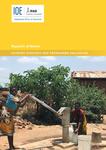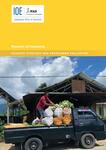Page Header
Nicaragua Country Strategy and Programme Evaluation
Overview
The IFAD-supported country programme has made significant contributions to rural development in Nicaragua. To address the rapidly changing institutional framework, IFAD has introduced flexibility into its programme and continues to provide support for the country's decisions and development plans. The programme has contributed to the development of national strategies on access to markets, assets and value chains; strengthening of rural organizations; promotion of non-agricultural rural activities; and adaptation to climate change. One clearly positive aspect of the programme has been its focus on family farming. In this regard, the programme has established an area of thematic specialization that has created a distinct comparative advantage for IFAD-supported activities in the country. There are opportunities to boost the contribution of non-lending activities under the programme. In particular, significant progress has been observed on policy dialogue in rural development, but has not translated into concrete contributions to policies and strategies. The strides made in knowledge management are still limited, due in great part to the lack of easy access to technical information or to the knowledge base accumulated by IFAD and other cooperation agencies. And partnerships with nongovernmental actors, including the private sector, are limited.Report Details
| Year Published | |
| Type | |
| Joint | No |
| Partner/s | N/A |
| Consultant name | German Escobar |
| Agency Focal Point | Miguel Torralba |
| Focal Point Email | m.torralba@ifad.org |
| Managed by Independent Evaluation Office | Yes |
| Country/ies |
YOU 'RE READING
Nicaragua Country Strategy and Programme Evaluation











